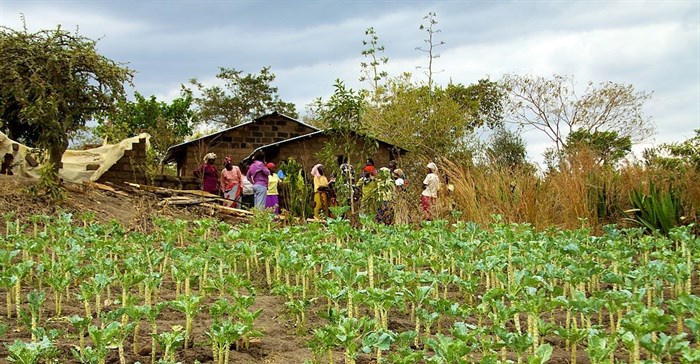Agriculture is big business in Africa. The sector employs 65% of the continent's labour force and accounts for 32% of gross domestic product (GDP), according to the World Bank. Yet it is beset by problems. Africa's population is growing - it is projected to reach two million by 2050 - but farm productivity is low, as a result of weather changes, lack of technical equipment and expertise, and the movement of young people away from farming areas to cities.
Help, however, is at hand. African entrepreneurs are increasingly seeing the inherent opportunities within the agriculture sector, developing solutions that do everything from helping farmers increase their yields to providing better access to markets.
Investors, too, are more and more attracted to a space that, should solutions scale widely enough, open up huge addressable markets. According to Disrupt Africa’s recently released African Tech Startups Funding Report 2017, agri-tech startups across the continent raised a combined total of $13.2m in funding last year, the fourth largest of any sector.
This was up 203% on 2016 figures, which had, in turn, been an increase of 8,660% on the pitiful $50,000 raised by agri-tech startups in 2015. It is a sector that has suddenly, and quite dramatically, sprung up the forefront of investors’ minds.
But why the sudden surge in funding?
Much of the 2017 total went to one company, Kenya’s Twiga Foods, which raised a $10.3m round in July. Launched in 2014, the company uses technology to consolidate the fragmented purchasing power of urban retailers, saving them a trip to the market by delivering to their doorstep better quality and better-priced stock.
Twiga Foods Chief Executive Officer (CEO) Grant Brooke told Disrupt Africa it was the size of the market that primarily accounted for the attractiveness of agri-tech startups. “Agriculture is one of the largest, and most untapped by technology, sectors of the economy. I think investors are targeting agriculture because it’s a huge market, that touches just about everyone,” he said.
“Agri-tech is hot right now internationally, and Africa is no exception. Investment tends to be macro-economically stable, people have to eat, and there are a number of acquirers perusing the space lately looking for opportunities.”
“People have to eat” is exactly the view of Onyeka Akumah, co-founder and CEO of Nigeria’s [https://www.farmcrowdy.com/ Farmcrowdy]], which allows users to sponsor farms and earn returns. The startup secured a $1m funding round in December, and Akumah believes people are beginning to pay attention to the growing demand for more food as Africa’s population grows. “There is growing interest in funding for agri-tech startups that focus on the real problem of food security and enabling better use of technology to grow the agriculture sector as a whole. It is a welcome and attractive idea for investors,” he told Disrupt Africa.
Potential sizeable returns increase investors’ appetites
Akumah said the potential for sizeable returns for investors in agri-tech startups are as big as the market these startups play in. “There are different levels of the agriculture value chain, and depending on what sector a startup plays in, the investors they attract would have done their due diligence as to the market size,” he said.
“For instance, at Farmcrowdy today, our investors are looking at the opportunity of scale that the $100bn agriculture sector in Nigeria presents to our business, along with the growing 189 million population and over 80 million hectares of arable farmland in the country. When things are done right with the right team, we have a good chance of succeeding with our goals for not just our investors but the country as a whole.”
Erick Yong’s company GreenTec Capital Partners is one such investor in Farmcrowdy and also has a stake in Ghana’s AgroCenta, which connects smallholder farmers to a wider online market to trade, access truck delivery services and get real-time market information. He agrees that investors are flocking to the space due to its massive growth potential and the fact it is currently very underutilised.
“On the one hand, more countries push for “home-grown agriculture policies” as they look to slow down the import flow of agricultural products, thus increasing the internal demand for agriculture and agri-services,” he said. “On the other hand, the increasing use of tech applications, everything from soil testing and drone technology through micro-credit and micro-insurance availability, via mobile wallets and digital platforms, will greatly enhance harvest yields and the overall productivity of the agriculture sector as a whole.”
Yong said both these factors naturally increase investors’ appetites, encouraging them to try to realise the growth potential at an early stage. He sees potential for significant returns.
Expected market growth opens up space for return-oriented backers
“The Food and Agriculture Organisation (FAO) predicts the size of the agriculture market in sub-Saharan Africa will grow from $200bn in 2015 to $1 trillion by 2030. This expected five-fold market growth presents very attractive investment return opportunities, especially for investors willing to take on risk earlier in the development process,” he said.
“We believe some of the more scalable, digital platforms could run at 50 to 100% annualised growth rates over the next three to five years as the market looks for winning, high growth business models.”
As a result, a space that was previously the domain of impact-focused investors and donors is opening up to more return-oriented backers. Yong said while development finance institutions (DFIs) and non-governmental organisations (NGOs) continue to play a big role in financially supporting agriculture projects across Africa, there is a clear trend towards the emergence of private and return-driven investors.
Impact funds themselves are also changing. Brooke said the major shift he has witnessed is that impact funds are becoming much more commercial. “I’m not sure there is a clear distinction between the two any longer,” he said. “That said, donors and social impact funds will continue to be the early-stage capital for agriculture startups. There isn’t much strictly commercial early-stage capital. But, as companies graduate up the funding ladder, we’ll see their capitalisation tables get more and more commercial with each passing round.”
Whatever the type of investor the money is coming from, the fact that funding is on a meteoric rise is of crucial importance to agri-tech startups.
Agri-tech projects a “scale game”, requires serious funding
Brooke says most agri-tech projects are a “scale game”.
“Funding is key for getting to scale. Further, as most models are new, funding is also needed to refine models, as we are just in the very early days on the continent of understanding what models are going to work in agri-tech,” he said.
Akumah agrees that startups relying on scale require serious funding in order to succeed. “When you tackle a big problem, you need the kind of backing that will allow you engage and successfully provide a solution for the big problem,” he said. “Most startups solving big and real problems require funding to scale. The reason why the problem is big in the first place speaks to why any startup looking to solve the issues would require resources, including funding, to tackle it properly.”
Yong, however, says this is not necessarily the case at the beginning of a startup’s journey. “In the very early stages, funding by itself is not the only ingredient for a winning recipe – successful entrepreneurs have to iterate and seek winning, profitable models,” he said.
Down the line, however, this changes.
“Once unit economics and profitability is more visible, the funding to scale and grow becomes a lot more important. A startup’s proven ability to execute should be able to draw a lot more funding on the follow,” he said.
Luckily, that funding is increasingly available. Africa’s agri-tech startups are solving big problems and serving potentially huge markets. Now, at last, there seems to be investor appetite for big funding to help them succeed.
View the original article published on Disrupt Africa.


























